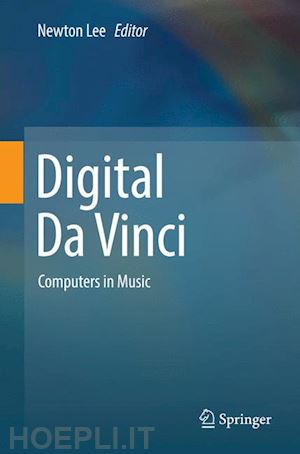

Questo prodotto usufruisce delle SPEDIZIONI GRATIS
selezionando l'opzione Corriere Veloce in fase di ordine.
Pagabile anche con Carta della cultura giovani e del merito, 18App Bonus Cultura e Carta del Docente
Chapter 1: A Tale Of Four Moguls: Interviews With Quincy Jones, Karlheinz Brandenburg, Tom Silverman And Jay L. Cooper.- Chapter 2: Getting On The Billboard Charts: Music Production As Agile Software Development.- Chapter 3: Producing And Its Effect On Vocal Recordings.- Chapter 4: Mediated Interactions And Musical Expression – A Survey.- Chapter 5: Improvising With Digital Auto-Scaffolding: How Mimi Changes And Enhances The Creative Process.- Chapter 6: Delegating Creativity: Use Of Musical Algorithms In Machine Listening And Composition.- Chapter 7: Machine Listening Of Music.- Chapter 8: Making Things Growl, Purr And Sing.- Chapter 9: Eeg-Based Brain-Computer Interface For Emotional Involvement In Games Through Music.- Chapter 10: Computer And Music Pedagogy.
Stephen Barrass is a researcher and academic at the University of Canberra where he lectures in Digital Design and Media Arts in the Faculty of Arts and Design. He holds a B.E. in Electrical Engineering from the University of New South Wales (1986) and a Ph.D. titled Auditory Information Design from the Australian National University (1997). He was a Post-Doctoral Fellow at the Fraunhofer Institute for Media Kommunication in Bonn (1998) and Guest Researcher in Sound Design and Perception at IRCAM in Paris (2009).
Tim Barrass has a background in electronic arts practice spanning over 20 years. In his visual and sound work he has explored ways of generating and understanding patterns of interaction in complex systems. He spent many years as a circus musician, developing custom software for electroacoustic instrumental performance in unpredictable circumstances. In recent times his focus has been on developing Mozzi, the sound synthesis library for Arduino. He is currently researching the ergonomics of typing with a cockatiel on each forearm.
Juan Pablo Bello is Associate Professor of Music Technology at New York University, with courtesy appointments at the Department of Electrical and Computer Engineering, and NYU's Center for Data Science. In 1998 he received a BEng in Electronics from the Universidad Simón Bolívar in Caracas, Venezuela, and in 2003 he earned a doctorate in Electronic Engineering at Queen Mary, University of London. Juan's expertise is in digital signal processing, computer audition and music information retrieval, topics in which he actively teaches, researches and publishes. His work has been supported by public and private institutions in Venezuela, the UK, and the US, including a CAREER award from the National Science Foundation. He co-founded the Music and Audio Research Lab (MARL), where he leads research on music informatics.
Mattia G. Bergomi is amathematician, Ph.D. student in Computer Science, and member of the Laboratory of Music and Computer Science (LIM). His research interest lies in the intersection between music and mathematics: On one side the representation of musical objects with instruments borrowed from the Algebraic Topology; on the other side the new analysis methods given by the Computational Algebraic Topology and their interaction with machine learning algorithms.
Simone Castellani is a student in Computer Science at Università degli Studi di Milano. In his thesis he developed experiments in quantitative and qualitative analysis of perception of the emotional interaction between visual and audio stimuli. His research interests are the analysis of the brain responses to multilayers stimuli and its application in artificial intelligence.
Kai Ton Chau is Associate Professor and the Jack Van Laar Endowed Chair of Music and Worship at Kuyper College in Grand Rapids, Michigan. He directs the college choir and ensemble, teaches several music courses and chairs the Arts and Sciences department. His diverse career in Hong Kong, Canada and the United States has afforded him the opportunities to serve at various churches, inter-church events, mass choirs and institutions of higher education (including Institute for Christian Studies in Toronto and Redeemer University College in Ancaster, Canada). Chau earned an Honors diploma in composition at the Hong Kong Baptist University, a Master of Music in choral conducting at the University of Missouri-Kansas City, an MBA from Laurentian University in Ontario, Canada and a doctorate in worship studies from the Robert E. Webber Institute for Worship Studies in Orange Park, Florida. He also holds professional designations (CGA, FCCA, CFP) in accounting and financial planning from Canada and the U.K.
Elaine Chew is Professor of Digital Media at Queen Mary University of London. Apianist and operations researcher by training, her research centers on the mathematical and computational modeling of aspects of performance, including music prosody, cognition, structure and interaction, so as to make explicit what it is that musicians do, how they do it and why. Previously, she was an Assistant then Associate Professor at the University of Southern California, where she founded the Music Computation and Cognition Laboratory and she held visiting positions at Harvard University and Lehigh University. Her research has been recognized by the US National Science Foundation Faculty Early Career Development Award and the Presidential Early Career Award in Science and Engineering, and a fellowship cluster on Analytical Listening through Interactive Visualization at the Radcliffe Institute for Advanced Study. She received PhD and SM degrees in Operations Research at MIT, a BAS in Mathematical and Computational Sciences (honors) and in Music (distinction) at Stanford, and FTCL and LTCL diplomas in P











Il sito utilizza cookie ed altri strumenti di tracciamento che raccolgono informazioni dal dispositivo dell’utente. Oltre ai cookie tecnici ed analitici aggregati, strettamente necessari per il funzionamento di questo sito web, previo consenso dell’utente possono essere installati cookie di profilazione e marketing e cookie dei social media. Cliccando su “Accetto tutti i cookie” saranno attivate tutte le categorie di cookie. Per accettare solo deterninate categorie di cookie, cliccare invece su “Impostazioni cookie”. Chiudendo il banner o continuando a navigare saranno installati solo cookie tecnici. Per maggiori dettagli, consultare la Cookie Policy.